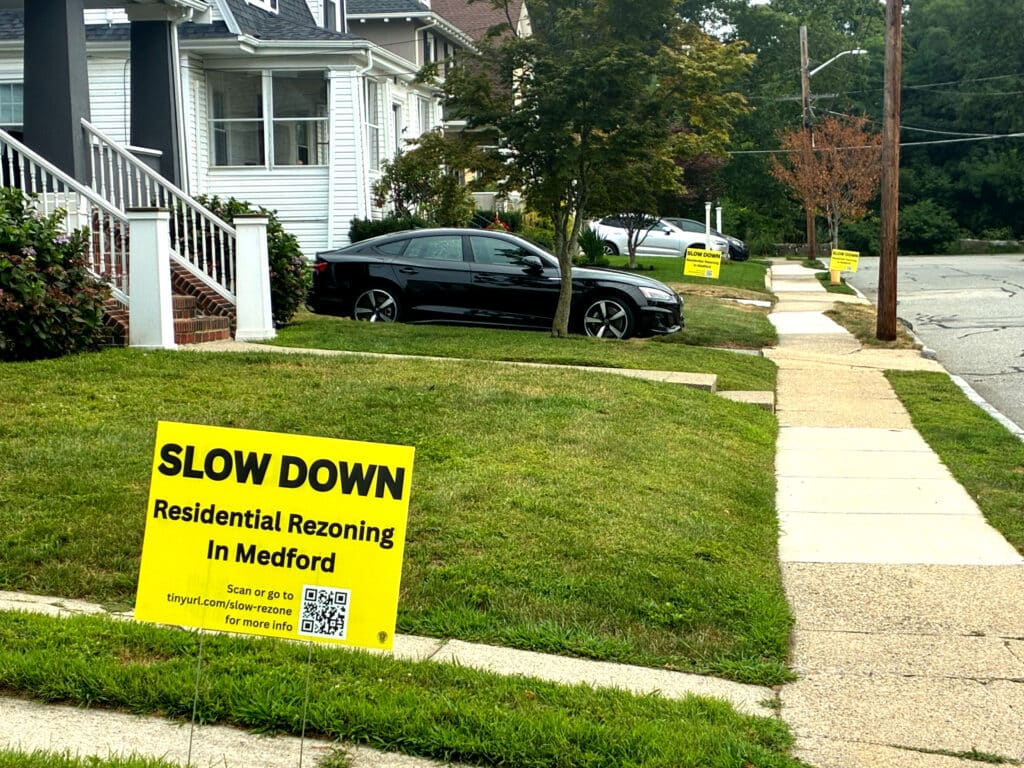
The median single-family home price in Medford has risen 43 percent over the past five years to $912,500. Photo by Steve Adams | Banker & Tradesman Staff
A sea change swept through Medford politics in 2021 when candidates endorsed by the Our Revolution movement founded by Bernie Sanders won a majority on the City Council after running on a progressive agenda.
The new councilors have sought to reshape future development patterns through the first citywide rezoning since the 1960s, with an eye toward increasing housing production and affordability.
But proposals to legalize small multifamily buildings in large sections of the city prompted an opposition campaign by residents who claim the proposal goes too far.
“The outreach was terrible and if you’re going to rezone an entire city, to be a responsible government, you want to make sure the stakeholders are aware of it,” said Will Snyder, a West Medford resident who has coordinated an opposition campaign in recent months.
Triple-deckers and duplexes proliferated in southern and eastern sections of Medford in the early 20th century following the extension of streetcar lines from Boston. But the passage of the Massachusetts Tenement House Act in 1912 prompted Medford and other suburbs to throttle down multifamily development. A backlash against Greater Boston’s postwar boom in small apartment buildings produced even more restrictions. Today, Medford has single-family zoning in the bulk of the neighborhoods west of Interstate 93 and north of Route 60.
What will the zoning actually allow? Read our summary here.
Snyder said he was alarmed to learn that his next-door neighbor could sell his single-family home to a developer to build a 6-unit apartment building if the rezoning passes.
“If that happens, we would just sell our property as well,” Snyder said.
The public outcry found a receptive audience in Mayor Breanna Lungo-Koehn, who denounced the rezoning for too-drastic increases in density and urged the City Council to delay a final vote.
First Changes Begin in Squares and Corridors
Medford home prices have risen hand-in-hand with much of the Greater Boston region in the past decade. Year-to-date, the median single-family home price in Medford is $912,500, according to data compiled by The Warren Group, publisher of Banker & Tradesman. That figure has risen 43 percent over the past five years.
The rezoning proposal is the culmination of a process that began in 2022. The city hired a consulting team including Newburyport-based Innes Land Strategies Group to draw up a comprehensive plan, with an eye toward updating zoning citywide for the first time since the mid-1960s.
The changes reflect the “People’s Platform” of the Our Revolution party’s Medford chapter, which endorsed six of the seven incumbent city councilors elected in 2023. It endorses “taller, denser and more mixed-use” zoning and elimination of minimum parking requirements.
The first changes took place last fall when the City Council approved mixed-use zoning including multifamily housing for Mystic Avenue, an existing commercial-industrial corridor, followed by similar rezoning along Salem Street, connecting Medford Center and Malden Center.
“Squares and Corridors” rezoning plans also are proposed for Medford Square, West Medford Square, Main Street and Broadway, all of which include existing commercial districts.

Public opposition to a citywide rezoning plan in Medford has increased in recent weeks, prompting the mayor to publicly oppose a plan eliminating many single-family zoning districts. Photo by Steve Adams | Banker & Tradesman Staff
But the residential rezoning proposal has attracted the most controversy in recent weeks. Cautionary yellow yard signs sprouted on single-family homes’ front lawns urging officials to “slow down” the decision timeline.
The residential proposal creates four new subdistricts in which multifamily housing would be allowed by-right, meaning that developers would not be required to obtain special permits from land-use boards if they meet certain dimensional requirements.
If the proposal eventually passes the City Council, up to six-unit buildings could be built in new urban residential districts surrounding the Tufts/Medford and Ball Square stations on the MBTA Green Line and MBTA commuter rail’s West Medford station.
These six-unit buildings, though, would still need at least 4,000 square feet of lot area, and face parking, height and lot-coverage requirements.
City Council candidate Melanie Tringali said she opposes “blanket high-density rezoning” and criticized the public outreach and consultants’ presentations.
“I know there are many people who are confused,” Tringali said. “Most people don’t understand zoning terms, so with the amount of rezoning they are trying to push through, the information is not very easily digestible and understandable.”

Steve Adams
Mayor, Councilor Lament ‘Information Vacuum’
Lungo-Koehn and councilors have traded blame over insufficient public outreach that has allowed social media rumors to spread without rebuttal.
At a July 17 council meeting, Medford City Council President Zac Bears defended the zoning proposal while lamenting growing public divisiveness. He asked for a delay in a final decision until early 2026 pending further presentations and hearings. And he requested that the mayor authorize an additional $150,000 to extend the zoning consultants’ contract through December 2026 and $50,000 to pay for communications to residents.
“In the past few weeks, I’ve been disappointed that so many residents feel that we haven’t done enough to engage them in the process: disappointed that we’ve created an opportunity to allow for an information vacuum that has led to the spread of misinformation and mistrust in this effort,” Bears said.
Lungo-Koehn responded by demanding the council agree to nine conditions before she authorizes the additional funding, including reducing the maximum 14-story building heights approved in late 2024 for Mystic Avenue that was part of a separate but related process.
“Unless the public sentiment suddenly shifts, I don’t believe the maps proposed by the City Council and under consideration by the Community Development Board should be revisited now or after the November election,” wrote Lungo-Koehn, who is unopposed for re-election, in a citywide email.
Approximately 1,300 housing units already are under development in Medford, Lungo-Koehn wrote, raising concerns about “maintaining the character of our neighborhoods and our city as a whole.”
Following a two-hour meeting with Lungo-Koehn on Aug. 4, Bears said he is optimistic that a compromise can be reached.
“The best thing we can do is move forward, get to an agreement and update our broken zoning so we can build more housing, hold more developers accountable and prevent displacement of our residents,” Bears said in an interview.






